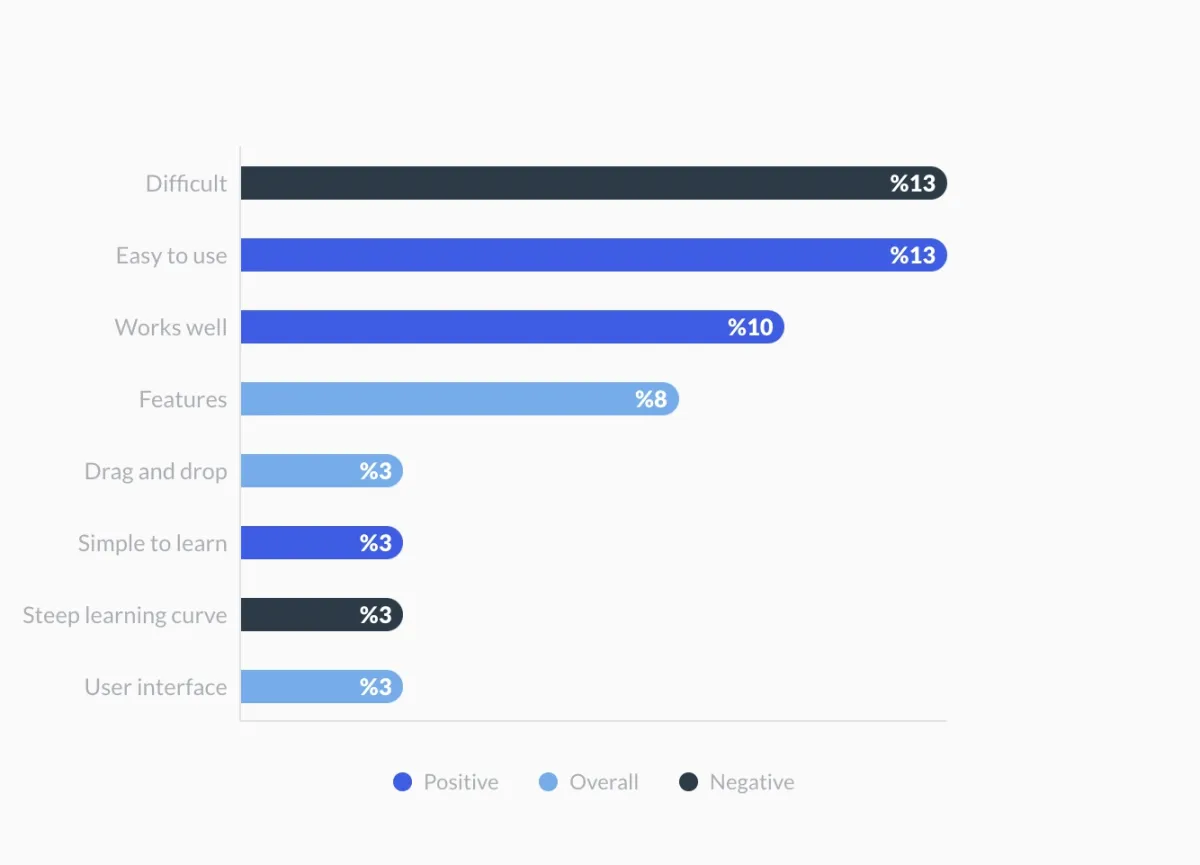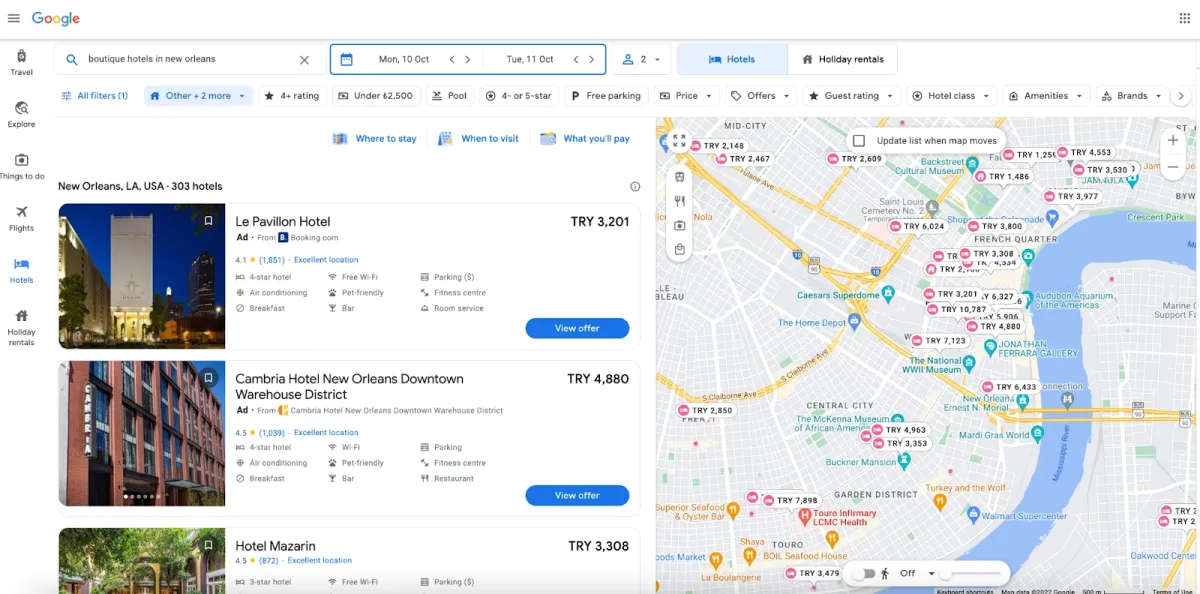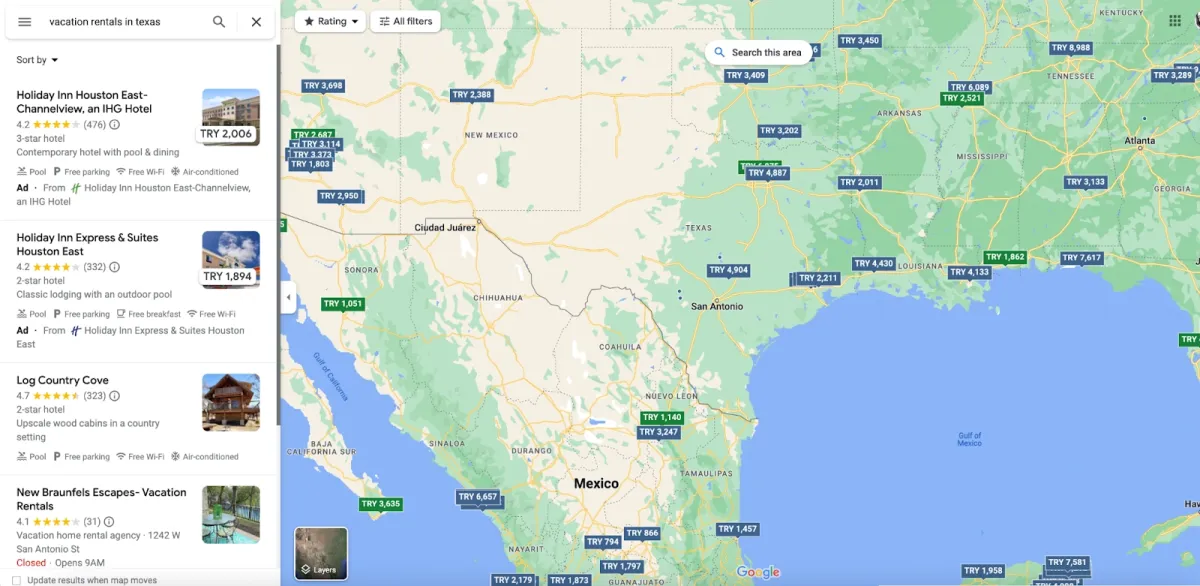There are several approaches to obtaining travel data: using pre-existing datasets, gathering your own data, or sourcing data externally. Whichever method you choose, effective travel data scraping requires a reliable tool to address potential data collection challenges.
See how web scraper APIs gather data from travel websites, top solutions for web scraping in the travel industry and the 5 common applications:
Top travel data scraping solutions
We’ve highlighted leading web scraping services, including those offering a dedicated travel data scraper API specifically tailored for gathering travel-related data—such as Bright Data and Apify. Other providers in the vendor comparison table do not have travel-specific scrapers, but their tools can be customized for data scraping from travel related websites.
| Vendor | Supported travel sites* | Scraper type** | Price/mo | Free trial |
|---|---|---|---|---|
| Bright Data | Airbnb | Dedicated | $500 | ✅ (7 days) |
| Smartproxy | No preset page templates exist | General-purpose | $50 | 3K free requests |
| Oxylabs | No preset page templates exist | General-purpose | $49 | ✅ (7 days) |
| Nimble | No preset page templates exist | General-purpose | $150 | ✅ |
| Apify | Booking Tripadvisor Airbnb | Dedicated | $49 | ✅ (unlimited)*** |
Transparency statement: The vendors with links are AIMultiple’s sponsors.
- *: Refers to the types of pages from which the scraper extracts and returns structured data.
- **: Dedicated APIs are purpose-built to gather data from travel websites. A general-purpose scraper, while not tailored for travel data, can be adjusted to perform this task.
- ***: Apify provides a $5 monthly credit for platform usage, which is automatically renewed as part of the free trial.
Comparison summary:
- Bright Data: Provides APIs for scraping Airbnb property information by URL and location.
- Smartproxy: Offers a general-purpose scraper API that supports data extraction by URL, with options for JavaScript rendering, device type selection (tablet, mobile, and desktop), and HTTP methods (GET and POST requests).
- Nimble: Delivers a general-purpose web scraping API for data extraction by URL, including page rendering and parsing capabilities, along with built-in support for residential proxies and a web unblocker.
- Oxylabs: Provides a general-purpose web scraping API that enables data extraction by URL with support for headless browsing.
- Apify: A developer-centric web scraping platform offering pre-built scrapers and features, such as datacenter and residential proxies, automatic IP rotation, and CAPTCHA solving.
1. Scraping hotel reviews and pricing
Assume you want to make a hotel reservation, and if you do not have a favorite hotel, you will search for hotels that are most suitable for you using an online travel agency such as Tripadvisor, or Booking.com.
After you enter the necessary information, such as check-in/out dates, the website will display the most relevant data that match your preferences. The algorithms used by travel websites generally rank hotels based on user preferences, popularity, and satisfaction. It is critical to have a high number of positive reviews to be ranked higher. Data scraping services help hospitality companies:
- Compare prices of hotel competitors to adjust their prices accordingly: Pricing strategy is influenced by strong competition, high taxes, unfavorable economic conditions, and the quality of products and services. If you want to adjust your prices based on your competitors’ prices. You need to collect publicly available information about your competitor’s prices.
- Turn customer reviews into insight: You can scrape your company’s and competitors’ customer reviews from web pages. Scraped vacation rental data allows companies to analyze sentiment in customers’ reviews ( see Figure 1). You can get insights about:
- Your customers’ preferences and expectations.
- Your pain points that need to be improved.
- How you enhance your marketing strategies.
- What/how your competitors do right.
Figure 1: Customers’ descriptive words for a specific product

2. Scraping flight/airline data
The airline industry implements various ticket pricing such as economy, premium economy, or business class. Ticket prices change according to:
- Flight date
- The number of seats left
- Itinerary dependencies such as one-way flights
- Sales volume like off-peak times, etc.
Web scraping helps airline companies understand current airline market conditions, offer personalized prices to customers, and manage customers’ demands. Scraper APIs can extract real-time flight data aboutflight schedules, flight duration, ticket price, plane name, arrival/destination time, and airline name. Web scraping is used by airlines for
- Price monitoring: It is crucial to keep up with the competition in the airline industry. Real-time pricing data allow airline companies to understand market demand and improve demand management based on current market conditions.
- Analyzing market share: Scraped flight prices can be used to analyze the current airline market conditions. Scraping travel data allows airline companies to
- Understand how their competitors are doing by analyzing their market share in the total airline industry share.
- Pinpoint growing investment areas in the airline industry.
- Analyze top players in the competition and understand how they differentiate their products and services.
- Improve growth strategy to increase your company’s visibility.
3. Analyzing travel/tourism trends
Suppose you are in the travel and tourism industry. In that case, your competitors are most likely using social media channels effectively for campaigns, brand building, and other purposes to improve their online presence. Data scraping process enables businesses to:
- Extract trending topics and hashtags on social media platforms via social media scraping tools.
- Aggregate travel news from blogs/travel sites.
- Monitor competitors’ social media channels.
How to scrape travel and tourism trends from websites
Let’s go over an example; assume you own a boutique hotel located in New Orleans. When you search “boutique hotels in New Orleans” many boutique hotels will appear in search results based on your search terms, reviews, ratings, and other factors (see Figure 3).
A quick tip: You can search for keywords that your hotel is trying to rank in Google search results, such as “boutique hotels for couples,” “boutique hotels for families,” “boutique hotels with child-friendly” etc.
Figure 3: Shows the search results for a “boutique hotels in New Orleans” query

The search result will allow your business to identify its top competitors who rank in your target keywords. You can check their websites and click on social media accounts on the website. Web scraping bots helps businesses collect publicly available hotel data from different social media platforms for trend analyzing. The following information can be collected from social media platforms:
- Keywords/hashtags: Search for your brand target keywords, location-specific hashtags, audience-specific hashtags, etc.
- Comments: Post date, post URL, comments, and likes.
- Profiles: Followers, following, Username, profile URL, etc.
4. Collecting travel related location data
When people search for a restaurant, hotel, vacation rental, or flights they use search engine’ maps to find the places in their areas. They search for “restaurants near me” or “hotels near me,” for example. This makes search engine maps data critical for businesses.
When you search for “vacation rentals in Texas” Google Maps displays many vacation rentals in the searched area (see Figure 4). Results can also be sorted by rating. Google Maps data is a good resource for connecting customers with businesses.
Web scraping tools collect information about real estate, hotels, restaurants, and vacation rentals. Companies can use Google Maps to scrape their competitors’ location details, customer ratings, and reviews.
Figure 4: Google Maps search result for “vacation rentals in Texas”

5. Extracting dynamic real-time travel data
Travel data scraping services enable travel websites to obtain real-time data from multiple web sources or specific web pages. Product price and stock information are examples of data that are constantly changing.
Assume you want to track and observe hotel room prices in a specific area for a month. In that case, your dynamic data is “room price,” which is constantly changing. Web scraping tools extract room pricing data on the first of the month. When the price of rooms changes on the website from which you scrape data, your scraper also updates the price data.
Web scraper will make numerous connection requests to hotel websites to update the price. If you make a connection request with the same IP address, the website will identify your scraper and block it to prevent data collection efforts.
A quick tip: Residential proxy servers can help you avoid being identified as a scraping bot.

Comments
Your email address will not be published. All fields are required.